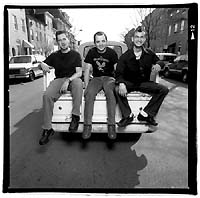|
Baltimore City Paper, March 22 - 28, 2000
Charmed, We're Sure
By Charles Cohen, Photo By Sam Holden
 Seven months ago, four guys and a girl looking for adventure and a fertile
music scene in which to nurture a band ventured into the exotic Land
of Pleasant Living.
Seven months ago, four guys and a girl looking for adventure and a fertile
music scene in which to nurture a band ventured into the exotic Land
of Pleasant Living.
Most young musicians with
Type-A personalities try unleashing themselves upon New York or Los
Angeles., Seattle or Austin. But listening to these Tennessee nomads
reflect upon their indoctrination into Baltimore culture -- their
fascination with Formstone, their fear of scrapple, their praise of
the local scene -- is to hear our same-old-same-old reborn as pure
inspiration.
Dale Naron (courteous frontman), Aaron Brame (class clown), Chris
Ward (rambling man -- since our interview he's left Baltimore and
the band for Brooklyn, N.Y.), John Whitaker (emotional ballast), and
Jennifer Lee (atmosphere-seeking artist, friend of the band but not
a member) left Memphis -- and what they say is an ailing music scene
-- for a city they'd never so much as visited. The Great Depression,
as the band is called, arrived last September in a convoy of four
Volkswagen buses, communicating via walkie-talkie as they made their
way up the highway. The only certainty about what awaited them were
jobs at the Inner Harbor Hard Rock Café for Whitaker and Naron,
who'd worked at the chain's Memphis outpost.
Whitaker says they decided upon Baltimore -- their bosses let
them choose which city to transfer to -- because it is the
northernmost Southern town, ideal for launching Northeastern tours
while staying in reasonably close to their roots. Besides, he says,
New York is too expensive, and Philadelphia too much like New York.
Before hitting the road, the friends shared their vague
impressions, which they got from friends who had been here, of what
Baltimore might be like. Naron thought it would be like an ant
colony, populated by rude people rushing in and out of office
towers. Lee imagined a green, tree-lined city.
"[Baltimore] was always painted in a very innocent way," Brame
says. "All I ever heard [about] was the Orioles and Camden Yards."
"And Tori Amos," Naron adds, name-checking the star who studied
at the Peabody Conservatory.
None of the quintet knew anything about the City of
Neighborhoods' neighborhoods, or about the city's historic
architecture and reams of rowhouses. Where they came from, they say,
every home has a yard or garage, and there are no historic urban
homes, Memphis having suffered much damage in the Civil War.
"I've never seen such a thing," Naron says. "I think in my
hometown in Lake Village, Ark., where I grew up, we lived in this
apartment complex when I was 9. Now that I think back on it, it was
basically four rowhouses sitting in the middle of a cotton field."
They also discovered homes that seemed to be made of some kind of
alien rocklike substance. A debate ensued about the pinkish and
bluish material's authenticity.
"We still weren't sure [whether Formstone was real rock] until we
saw one hit by a car and saw a big piece broken off with, like, the
chicken wire behind it," Whitaker says.
They found their piece of Formstone in Upper Fells Point. The
place is set up like the typical band house -- the requisite lava
lamp in the corner, a basement practice room bedecked with strings
of Christmas lights, and a fretboard chart bearing the admonition
NOTES FOR STUPID. The four Vespa scooters in the front room give the
place a chop-shop look.
From their first day in Baltimore, the members of the Great
Depression have been on the path of assimilation. Whitaker says
eyeglasses here are more stylish. Naron notes their neighbors'
predilection for ankle socks and pegged jeans. They were amused by
what they call the "hillbilly poser" movement -- folks on the music
scene who hang hand-framed photos of trailers in their living rooms
and wear tight cutoffs and rebel-flag belt buckles to club shows.
"This music scene -- this Arkansas chic, people walking around
acting like they're from trailer parks -- they have no idea," Naron
says.
They were delighted to discover crab cakes -- a step up (in price
as well as taste) from the Memphis delicacy "garballs," made from a
fish called "gar" (known as carp up North) ground up and deep-fried.
But none of the newcomers has the stomach for scrapple. Naron
recalls asking a waitress at the Fells Point landmark Jimmy's
Restaurant about it.
"She said, 'It's a breakfast meat,'" he says. "I said, 'No, no,
no, you're not getting off that easy.' " But he never did get a
better explanation.
After six months of writing music and practicing, the Great
Depression emerged from their Fells Point basement in February to
play a show, at the Ottobar.
Standing in an alley outside the downtown rock club, Lee gazes up
at the architectural flourishes of the neighboring Clarence M.
Mitchell Courthouse. People who grew up here, she says, don't
realize how good they have it. New York is just a four-hour drive
away; back home, they had to drive 13 hours to Atlanta to see the
Beastie Boys.
"It's sort of cozy but a little bit progressive, but not cozy in
a backwoods, Southern way, where it's comfortable and no one's
trying new things," Lee says of her new home.
©2000 Baltimore City Paper
|